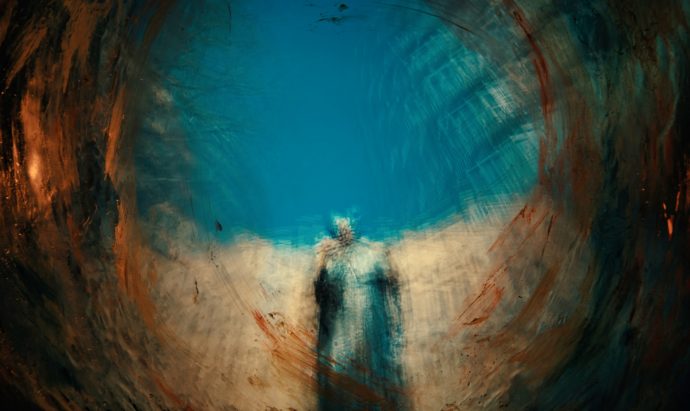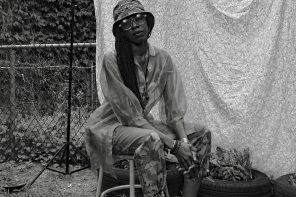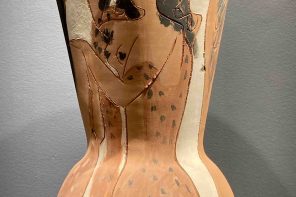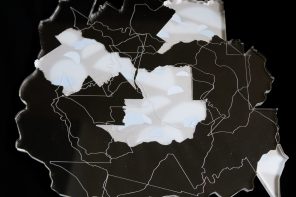Whenever I stop on her planet, she finds me and makes me stay for dinner. She says she can feel it when we’re breathing the same air—that the smog smells muggier, gets heavier with dust, when I exhale into it—but I think she just knows someone who works at the control tower. Not that I’d ever try to point this out. She likes the idea of knowing me. I think, in recent years, she needs it. So I let her steer her hoverbike she must’ve snatched from a prospector to the foot of my ship and take off that filthy helmet she must’ve peeled off a dead miner’s head and shake out her grey curls and say, Little Seven, I made your favorite.
Last week, I became a vegetarian. They were streaming a documentary on the pirate radio about how the indigenous inhabitants of the farming planets in Zone B get treated by the Imperial agricultural administration, and it’s not like I didn’t know about these kinds of things before, but it felt like the right time. An hour before her arrival, I traded the last of my meat for a new knife.
I tell her about this, and she frowns for a moment before her brows smooth out again. It’s an expression I know well: when she was my shifu, I saw it on her every day, even for small things like spilling water when I fetched it from the recycling tank or using the wrong character in an exam. It’s strange to recall those times, though, and to see her face as young. These days, there is a permanent wrinkle on her forehead so that she always looks angry. Always looks ready to tense the muscles in her shoulders and turn her back to me, fall into silence. She hasn’t done that in years, not since I grew up and found her again; she can’t afford to drive me away. Yet when I call out to her, leaning on the top step of my ship with one hand on the banister and the other holding my steadily slipping toolbox against my hip, I catch and keep that flicker of unhappiness in her brows. And it makes me wonder whether my decision to become a vegetarian was, on some unconscious level, taken precisely to provoke her. To see what my shifu would do if our long-established ritual were deprived of its central instrument—the beggar’s chicken.
It turns out that nothing changes, because by the time I walk down the rest of the steps and go to stand in front of her, sullen, she simply shrugs and says that she doesn’t care; I’m to eat the chicken anyway. So that’s that. I get onto the back of her hoverbike and she takes me home.
She takes me straight through the compound and to the garden, where I take the chicken, in its clay-pot covering, out of the hole in the dirt in nothing but my pilot’s gloves. She makes me set the scalding hot package onto the stone dining table and smash the clay. She says grunt work is the only thing I’m good for, since apparently I’ve retained none of the things she worked so hard to teach me and instead choose to gallivant across the Empire with the sole purpose of bringing shame to her gate and her art. I only realize that I’m still wearing my goggles when the steam fogs up my lenses. When I unwrap the lotus leaves, they come away in strips, revealing golden chicken skin and the smell of smoke and cumin and eye-watering spice. I dig the heel of my palm into my eyelids. The meat, once we cut into it, is tender and rich, parting as easily as my shifu’s legs, later, on the other end of the table where there’s enough room for me to turn her onto her stomach and press closed-lipped kisses to her nape while she begs.
Afterwards she asks me if I have a girlfriend or a wife and I say no. She says I should find one, girl like me without anyone to take care of and go home to, and I say I have one of those.
When the smog dissipates enough for the sunset to come out, she calls to me from the garden. Little Seven, come see this. I’m practicing my forms in the disciples’ courtyard so I drop my staff with a clang, but she adds, Bring the Dog-Beating Staff. I do. She says, Stop blocking my sunlight, and I realise I’m standing to her west, so I move to the other side.
It’s late summer, which over here lasts about five terran years. Spring had only just ended the first time I bit her on the bottom lip, behind the wheels of my ship. Now, the temperature’s falling, but there are still mosquitoes buzzing around us, here on the only planet in the Empire that has mosquitoes—the first settlers, back when this was just a mining outpost, had realized the mosquitoes were an essential part of the ecosystem and made a case for their preservation. As students growing up under this gate we’d been taught, using this anecdote, that all life was precious. Even that of a vampire. Only after I grew up and met other people from other gates, with other shifus and other arts, did I come to appreciate our compassionate education. It made me understand the vastness of the Empire. Anyone could become a mosquito. Whole planets of people, swatted.
Shifu ties her hair back and shuts her eyes. Her cheeks and neck take on a reddish glow in this light. A bite on her collarbone, white and swollen, smelling of paste. She scratches her neck with her pinky nail. At her peak, the nail was an informal symbol of hers, which was funny because she was otherwise seen as so pristine. She uses it to pick her nose, but people thought it had some mystical meaning, that maybe it was what she used to conduct qi. In the early years of my traveling, betting men who watched me fight would visit me after I won and knowingly wag their pinky fingers: Are you . . . ? I’d smile and then grimace around it so that I seemed insolent; at the same time I’d show them my finger in return, and they’d know I was hers.
That’s when I was green. It didn’t take long for me to want to shed everything she’d given me. When, at the beginning of this summer, I ran into Shifu again while refueling at a space station, I was shocked that she recognized me. All I could do was reach out my hand for her to shake it. I was so nervous. She frowned with disapproval when she saw the itchy stump of my severed finger and said, So the rumors are true. I hid my hand. I said, I heard no one wants you anymore. She slapped me.
Of course I regretted saying that immediately. It’s not her fault that the mines on her planet began to run dry. She left, but I saw her a few hours later in a saloon and poured her wine, and she was mollified.
I showed her my ship disguised as a postal vessel with its yellow stripes. She asked me if I had a name for it, and I said no. She asked me if I knew where I was going next, and I said no. She asked me if I remembered the coordinates for home.
She’s only ever asked me to stay once, which was that first time. I was glad to hear it. She made me lunch, and I remembered that beggar’s chicken tastes special with earth from this planet, dark red clay scooped from the stream that runs behind Shifu’s compound. It used to have such a strong current, that water. We used to greet it in the morning when we practiced our dawn forms as a row of children in starched uniforms and arranged in order of height. My shixiongs and shidis are all dead now, or at least I hope they are. I’m the only one left, and I betrayed my gate when I dared to open my own. I’m wicked, she would say, before taking off her clothes.
She thinks I lost my finger doing something heroic or at least out of spite, but the truth is I was sentenced to it after the cargo on my previous ship exploded and killed someone important. The story was all over the pirate radio, but she doesn’t listen to that. It’s not that she likes the Empire, but that she thinks she can live beyond its reach. She inherited her own shifu’s gate and she still calls the night sky by the name her shifu had given it: rivers and lakes. Shifu looks at the stream behind her compound, contaminated from the mines, thin and weak, and still thinks she can drink from it. She says freedom is flight. She says water is life.
She took me in as a child and told me my surname is Hong; it means flood. I don’t know if it was really what my parents were called, or if I was named after what killed them. Maybe there’s a reason why her only foreign-born disciple is the one that came back to her.
Little Seven, Shifu says. I snap back to attention. She’s been looking at me, I can tell. I remember she’d asked for the Dog-Beating Staff and I hand it to her. She feels its weight in her palms, her rings clinking lightly against the metal. It hasn’t occurred to me, until now, that she might genuinely be interested in the weapon, in the art that I cobbled together from her gate’s basic principles and the precision of Empire agents’ training and the wild risks of my other master’s drunken barroom brawls. I’d show her all thirty-six of my moves if she wanted, and Xianglong Eighteen Palms, too. Everything in my repertoire, as repayment for hers. I wait for her to speak.
What she says, eventually, is, They came to ask about you. It takes me a second too long to react; I reach for the staff and there’s resistance, her grip tightening around it. But then she lets go. You shouldn’t come back.
There’s not much left on this planet. The last of its uranium is in unmarked crates on my ship. The sandstorms get worse every year, and Shifu’s garden smaller.
What about you? I ask. When I was young, there was a time when I hated her, and even then I couldn’t imagine what it would be like for her to die.
Shifu clicks her tongue. Give me a ride?
I do.
Jiaqi Kang is a Sino-Swiss editor, writer, and art historian. Find them online at jiaqikang.carrd.co.




